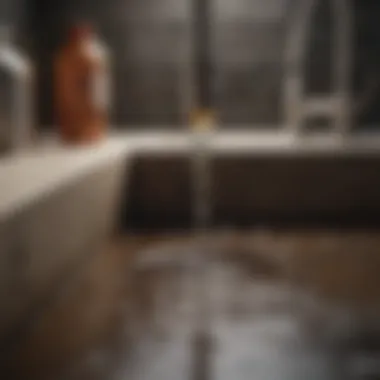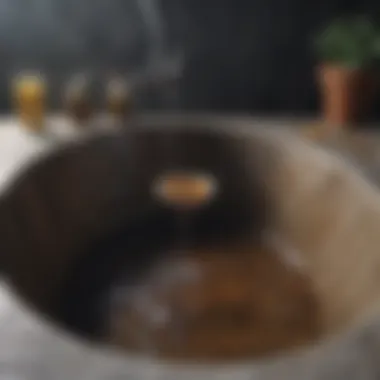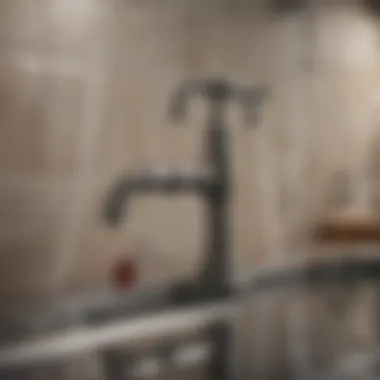Understanding the Impact of Vinegar Disposal Down the Drain


Curious about the impact of vinegar on plumbing and the environment? This comprehensive guide takes an in-depth look at whether vinegar can be safely disposed of down the drain. By examining various aspects of this common household query, readers will gain valuable insights into best practices for handling vinegar in the context of drain disposal.
Inspiring Homes
When considering whether vinegar can go down the drain, it's essential to understand its potential effects on plumbing systems, septic tanks, and wastewater treatment facilities. Vinegar, a mild acid commonly used for cleaning and cooking, may have implications for drainage systems if not disposed of correctly. This section will delve into the impact of vinegar on pipes, drainage infrastructure, and the environment.
- Luxury Properties: Showcase of extravagant mansions and villas worldwide
Explore how luxury homes tackle the disposal of household substances like vinegar while maintaining top-tier plumbing systems and environmental standards. Discover how opulent residences address drain disposal practices in their state-of-the-art kitchens and bathrooms, ensuring the longevity of their sophisticated plumbing fixtures.
- Cozy Retreats: Feature on charming cottages and rustic cabins
In quaint cottages and cozy cabins, where charm meets function, understanding the implications of pouring vinegar down the drain is crucial. Delve into how these intimate dwellings balance effective waste disposal with environmental consciousness, creating a nurturing space that integrates sustainability into everyday practices.
- Unique Architectural Styles: Highlighting innovative design concepts and stunning buildings
Investigate how innovative architectural designs incorporate eco-friendly waste management solutions that align with modern sustainability goals. Uncover cutting-edge approaches to integrating vinegar disposal practices into the blueprint of stunning buildings, blending functionality with environmental responsibility.
Stunning Locations
Interior Design Trends
Travel Guides
Real Estate Market Insights


Stay tuned for further insights on the impact of vinegar on plumbing systems, the environment, and alternative disposal methods as we delve deeper into the ultimate guide on whether vinegar can go down the drain.
Introduction
The topic of whether vinegar can be safely disposed of down the drain is a crucial aspect of household maintenance and environmental responsibility. As a commonly used kitchen ingredient, understanding the implications of pouring vinegar down the drain goes beyond just a simple task. This guide aims to dissect the complexities surrounding this topic, shedding light on the effects of vinegar on plumbing systems and the environment. By exploring the nuances of vinegar disposal, readers will be equipped with the knowledge to make informed decisions that not only benefit their plumbing but also contribute to sustainable practices.
Vinegar, a staple in most homes for cooking and cleaning purposes, holds properties that may interact with plumbing materials and impact drainage systems over time. This guide will delve into the composition of vinegar, specifically analyzing its acidity levels, which play a pivotal role in determining its compatibility with drainpipes. Additionally, we will explore how the corrosive potential of vinegar can influence the longevity of plumbing fixtures and the risks associated with blockages that may arise from improper disposal. By dissecting these aspects, readers will gain a comprehensive understanding of the implications of pouring vinegar down the drain, highlighting the need for careful consideration and proper disposal methods.
Furthermore, this guide will address the environmental implications of vinegar disposal, focusing on its potential to contaminate water systems if not handled appropriately. By examining eco-friendly disposal practices, readers will be informed of the importance of incorporating sustainable methods in their daily routines. From discussing the risks associated with pouring vinegar down the drain to emphasizing the significance of responsible waste management, this section aims to outline the broader environmental impact and encourage readers to adopt practices that promote a cleaner, healthier living environment.
In essence, this comprehensive guide will equip readers with the necessary knowledge and insights to navigate the intricate world of vinegar disposal. By emphasizing the importance of understanding the effects of vinegar on plumbing systems, highlighting eco-friendly disposal practices, and presenting drain-safe alternatives, readers will be empowered to make conscious decisions that benefit both their living spaces and the environment.
Understanding Vinegar
Vinegar, a commonly used household product, plays a crucial role in various applications beyond just culinary uses. Understanding the properties and composition of vinegar is essential when considering its disposal down the drain. By delving into the intricacies of vinegar, individuals can grasp its diverse uses and potential impacts on plumbing systems and the environment. This section will explore the importance of comprehending vinegar's nature, shedding light on its chemical composition, acidity levels, and overall influence on drainage systems.
Composition of Vinegar
Vinegar is primarily composed of acetic acid and water, with trace amounts of other chemicals that vary depending on the type of vinegar. The acetic acid content in vinegar is responsible for its sour taste and potent odor. Additionally, vinegars such as apple cider vinegar may contain residual sugars and nutrients from the fermentation process, adding to their complexity. Understanding the composition of vinegar is crucial for determining its compatibility with drainage systems and the environment.
Acidity Levels
Vinegar's acidity levels typically range between 2% and 7%, with variations based on the type and fermentation process. The p H level of vinegar plays a significant role in its effects on plumbing, as highly acidic substances can corrode metal pipes and fixtures over time. By examining the acidity levels of vinegar, individuals can make informed decisions regarding its safe disposal down the drain, considering the potential consequences on drainage infrastructure and the surrounding ecosystem.
Effects on Plumbing
When considering the impact of vinegar on plumbing systems, it is vital to understand the potential consequences of pouring vinegar down the drain. The acidity of vinegar can have both positive and negative effects. While it can help in breaking down buildup and deodorizing the pipes, excessive use of vinegar can lead to corrosion and damage to the plumbing infrastructure. This section will delve into the intricate details of how vinegar interacts with various plumbing components and the measures to mitigate any adverse effects.


Corrosive Potential
The corrosive nature of vinegar is a key aspect to consider when contemplating its disposal down the drain. Vinegar, with its acidic properties, has the ability to erode certain materials commonly found in plumbing systems, such as metal pipes and fittings. This erosion can result in leaks, weakened joints, and overall deterioration of the plumbing network. An in-depth examination of the corrosive potential of vinegar will be undertaken in this section, shedding light on the specific mechanisms through which vinegar can cause damage and offering recommendations on how to prevent such issues.
Risk of Blockages
Another critical factor associated with pouring vinegar down the drain is the risk of blockages. While vinegar can act as a natural cleaner, loosening debris and buildup within pipes, its improper disposal can lead to clogs. Residues from vinegar, when combined with other substances in the drain, may solidify and restrict the flow of water. This subsection will explore the likelihood of blockages occurring due to vinegar disposal and provide insights into preventive measures that can be adopted to maintain optimal drain function and prevent any disruptions in the plumbing system.
Environmental Impact
In the context of can vinegar go down the drain, the environmental impact holds significant importance. Environmental Impact serves as a crucial aspect of this discussion, shedding light on how our everyday choices, such as drain disposal methods, can affect larger systems. Understanding the repercussions of vinegar in our drainage systems is essential to environmental stewardship. By examining the environmental implications, we can make informed decisions that align with sustainability practices.
Water System Contamination
Water system contamination stands out as a pivotal concern regarding the disposal of vinegar down the drain. The introduction of vinegar into water systems can lead to contamination issues, potentially compromising the purity and safety of the water. This contamination can have far-reaching consequences on public health and the ecosystem. Exploring the risks associated with water system contamination from vinegar disposal underscores the need for responsible and mindful disposal practices.
Eco-Friendly Disposal Practices
When contemplating can vinegar go down the drain, eco-friendly disposal practices emerge as a pressing topic. Implementing sustainable and eco-conscious methods for disposing of vinegar is crucial in minimizing our environmental footprint. By adopting eco-friendly disposal practices, such as utilizing natural alternatives or recycling options, individuals can contribute to environmental preservation efforts. Examining the role of eco-friendly practices in vinegar disposal offers insights into practical solutions for reducing waste and promoting ecological responsibility.
Proper Disposal Methods
Proper disposal methods are crucial when discussing the disposal of vinegar down the drain. It is essential to understand the potential consequences of improper disposal on plumbing and the environment. By elucidating the significance of adopting proper disposal techniques, individuals can mitigate the adverse effects of vinegar on drainage systems. Implementing responsible disposal practices not only ensures the longevity of plumbing infrastructure but also contributes to overall environmental sustainability.
When considering proper disposal methods, several key elements must be taken into account. Firstly, it is important to recognize that vinegar, despite being a common household item, can have corrosive properties that may harm drainage systems over time. Therefore, choosing appropriate disposal techniques that minimize the risk of corrosion is imperative. Additionally, understanding the impact of vinegar on water systems is essential for making informed decisions regarding disposal practices. By exploring the acidity levels and composition of vinegar, individuals can better gauge its potential effects on plumbing infrastructure.
Furthermore, focusing on the benefits of proper disposal methods is paramount in this discussion. By utilizing safe disposal practices, individuals not only safeguard their plumbing from potential damage but also contribute to preserving water quality and environmental integrity. Promoting responsible disposal habits within households can lead to a collective reduction in environmental contamination and pollution. Therefore, emphasizing the importance of adhering to proper disposal methods is key to ensuring the sustainable management of household waste, including vinegar.


Lastly, considerations about proper disposal methods extend beyond individual households. Municipal regulations and guidelines regarding the disposal of household substances play a significant role in shaping community-wide waste management practices. By complying with local disposal regulations and exploring eco-friendly disposal options, individuals can actively participate in promoting a cleaner and greener environment.
Drain-Safe Alternatives
When it comes to drain-safe alternatives for disposing of vinegar, several options are available to individuals seeking environmentally friendly disposal methods. One alternative to pouring vinegar down the drain is to dilute it with water and use it as a natural cleaning solution. This diluted vinegar solution can effectively clean various surfaces in the household without posing a risk to drainage systems.
Another drain-safe alternative is to utilize vinegar in combination with baking soda for cleaning purposes. This mixture creates a natural bubbling reaction that can help clear mild clogs in drains without causing damage to plumbing fixtures. By harnessing the cleaning properties of vinegar in a safe and eco-friendly manner, individuals can maintain a clean home environment while minimizing the adverse impact on plumbing systems.
Exploring further drain-safe alternatives involves utilizing vinegar in household chores such as laundry and gardening. Vinegar can act as a natural fabric softener in laundry, reducing the need for synthetic chemicals that can be harmful to the environment. Additionally, incorporating vinegar into gardening practices can help control pests and nourish plants without introducing harmful substances into the soil.
By diversifying the usage of vinegar beyond drain disposal, individuals can tap into its versatile properties for various household applications, promoting sustainable living practices and reducing the reliance on potentially harmful cleaning agents.
Household Applications
Understanding the diverse household applications of vinegar can enhance its role beyond drain disposal. Incorporating vinegar into everyday tasks can yield a range of benefits, from promoting hygiene to minimizing environmental impact. By exploring the multifaceted uses of vinegar in household settings, individuals can harness its natural properties for various cleaning and maintenance purposes.
Household applications of vinegar span across cleaning, cooking, and skincare routines. In cleaning, vinegar serves as a versatile and eco-friendly alternative to commercial cleaning agents, effectively removing stains and odors without harsh chemicals. Whether used as a surface cleaner or a deodorizing agent, vinegar proves to be a valuable asset in maintaining a clean and hygienic living space.
In cooking, vinegar adds depth and flavor to a myriad of dishes, enhancing culinary experiences with its acidic profile. From salad dressings to marinades, vinegar contributes tanginess and complexity to recipes, elevating the overall taste profile of dishes. Furthermore, vinegar can be utilized in pickling and preserving foods, extending their shelf life while imparting distinct flavors.
On the skincare front, vinegar's astringent properties make it an effective natural toner and cleanser for the skin. When diluted with water, vinegar can help balance the skin's p H levels, reducing acne and promoting a clear complexion. Incorporating vinegar into skincare routines can offer individuals a natural and cost-effective way to maintain healthy skin without relying on synthetic products.
By recognizing the wide-ranging applications of vinegar in daily life, individuals can maximize its utility while minimizing waste and environmental impact. From household cleaning to culinary endeavors, vinegar emerges as a versatile and sustainable solution for various needs, showcasing its value beyond drain disposal.
Conclusion
As we navigate through the intricate world of vinegar disposal, it becomes evident that the question of whether vinegar can go down the drain is not a simple one. The significance of this topic lies in its far-reaching implications on plumbing systems, environmental sustainability, and household practices. By delving into the complexities of vinegar's interactions with plumbing infrastructure and the environment, we can glean valuable insights into the best practices for handling this common household item.
In this ultimate guide, we have dissected the composition of vinegar, unraveling its acidic nature and the potential consequences of introducing it to drainage systems. We have explored the corrosive tendencies of vinegar and the risks it poses to plumbing fixtures, shedding light on the importance of cautious disposal methods.
Moreover, our discussion has extended to the environmental ramifications of vinegar disposal, scrutinizing its impact on water systems and advocating for eco-friendly approaches to mitigate contamination. By examining the broader eco-systemic effects of vinegar down the drain, we underscore the interconnectedness of household actions with environmental well-being.
Through the lens of proper disposal methods, we have outlined drain-safe alternatives to prevent clogs and blockages, emphasizing the significance of responsible waste management within the household. By offering insights into household applications and sustainable disposal practices, we equip readers with the knowledge needed to make informed decisions regarding vinegar disposal.



